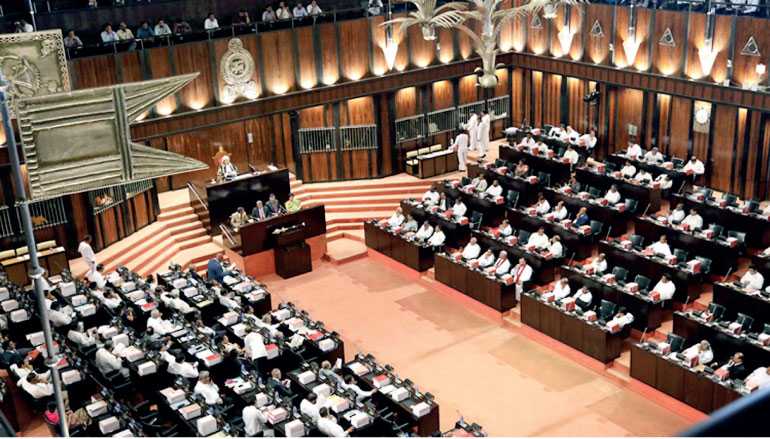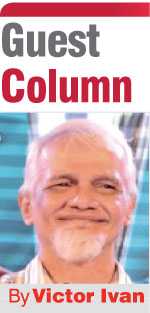Sunday Feb 15, 2026
Sunday Feb 15, 2026
Friday, 24 July 2020 00:23 - - {{hitsCtrl.values.hits}}

Weren’t the Presidents, MPs, Ministers and the Members of Parliament who ruled the country aware of the prevalence of a system for more than 40 years in which the public property of the country under their temporary control had been plundered by them?
From 1948 to 1978 Sri Lanka had a parliamentary system of government. A fully-fledged parliamentary system of government on British Westminster model was established by the Soulbury Constitution, which gave Sri Lanka the Dominion status. The position of the Governor General under the Soulbury Constitution and that of the President appointed under the Republican Constitution of 1972 was more or less similar to that of a Constitutional King. The Cabinet, headed by the Prime Minister, who is accountable to parliament, served as the centre of power.
This system worked well, performing an optimal role until it was turned upside down in 1978. Up to then everything went well and smoothly except the issue of protecting the Constitution and acting in conformity with it. The citizens had the opportunity to change governments from time to time through elections. Usually in most elections there occurred a change of government. High standards were maintained in Parliamentary proceedings. The Parliamentary debates were of high standard and the attendance at Parliamentary sittings and Working Committee Meetings were satisfactory. Legislation was done well and the monitoring role was fulfilled satisfactorily.
The Members of Parliament came under close scrutiny and the laws restricting election expenses were strictly enforced. A system of tracking election expenses was in operation. There was also a system in place which deprived those who violated election laws, of their parliamentary seat. The old parliamentary system faced a military coup in 1962 and a violent uprising in 1971 successfully.
Seducing the Parliament
The Executive Presidential system introduced by J.R. Jayewardene under the second Republican Constitution in 1978, transferred all the powers of the State to the President thereby abolishing the supremacy of Parliament and turning it into a mere rubber stamp of the President. The electoral system based on constituencies with individual candidates which was commonly described as the First-past-the-post (FPP) system was abolished and changed into a system of proportional representation on district basis in selecting the Members of Parliament. The by-election system was eliminated. Also, the laws limiting election expenses by candidate’s disappeared. The system of tracking election expenses incurred by candidates was also abolished.
A depraved system was devised to keep the MPs happy and in a satisfactory temperament who apparently were distressed due to the deprivation of the supreme recognition enjoyed by the Parliament and the MPs, by allowing them to plunder common public property.
In no country in the world where a democratic political system is in operation, the elected representatives of the people are not allowed to engage in business transactions with the government, buy government property or sell property to the government. Such practices are considered a serious offense leading to removing them from their positions. A similar policy was in operation in Sri Lanka too, until 1978. In rare incidents where such offenses were committed, the culprits were deprived of their parliamentary seats. Albert Silva elected to the Galle electorate in 1977 from the UNP was deprived of his post of MP by the Court because he possessed a kerosene license issued in his name by the Petroleum Corporation. President Jayewardene turned this system that worked well, upside down. An infamous system was created enabling the MPs of the ruling party to plunder public property. If the ruling party members had the slightest hesitation or fear in pursuing this illegal and corrupt system introduced by him, the President himself set precedents of ruthless type to remove their sense of fear.
President Jayewardene had a coconut estate in Madampe, Chilaw which he had inherited from his father. It was a barren coconut land of 50 acres. The President handed over the coconut land to the Land Reforms Commission and acquired 50 acres from the Keena Kele Estate, a fertile coconut estate owned by the Commission. Following this example, the MPs and the Ministers of the ruling party became commercial planters by purchasing government estates at a nominal price. As the extent of land taken over by the government was as huge as one million acres, the plunder of estate land continued under the other Presidents as well.
Opening the gates of corruption
In addition to allowing the MPs to acquire the estates owned by the State, President Jayewardene also allowed them to act as government contractors and the owners of licenses to work as the dealers of timber, stone, sand, and passenger transport. The successors of President Jayewardene too, continued this destructive and corrupt system introduced by JR adding new features to it.
More than 1,500 liquor licenses were distributed through government MPs during the rule of President Chandrika. As a result, a significant number of ruling party MPs became licensed bartenders, directly or indirectly. This plunder of resources while enriching the Presidents, Ministers, MPs and their cronies caused to impoverish the government treasury.
The unsolved puzzle
More than four decades have passed since this system that allowed the plunder of public property by Presidents, Ministers, Members of Parliament, their crony officials and businessmen had been established. As a result, Sri Lanka is now in a situation where the country has become a hapless chew, the essence of which has been sucked to the fullest.
But the most puzzling question which is not easy to understand is that, in spite of the fact that more than 40 years had lapsed since the establishment of this predatory system in Sri Lanka which is vicious and corrupt, so far, no political party representing the Parliament, no Member of Parliament or no Parliamentary Authority has spoken openly, of this massive plunder of state property occurring, of course with the patronage of Parliament itself. Strangely, this topic has never been discussed in Parliament. No motion has been moved in this regard. No criticism has originated from within the Parliament.
How did it happen? Weren’t the Presidents, MPs, Ministers and the Members of Parliament who ruled the country aware of the prevalence of a system for more than 40 years in which the public property of the country under their temporary control had been plundered by them?
Except Ranjan Ramayana who had aired his concerns openly against the massive plunder of state property, in his simplistic and disorderly style, no member of parliament has ever spoken about it. No political party representing the Parliament has spoken about it. Even the Speakers of Parliament have not treated it as a serious issue affecting their conscience. There were six occasions in which the proposals for reformation of the system of governance presented since 1978. Why is it that no proposals were made in any one of those occasions to rectify this serious error?
What happened to the conscience of political parties, good or bad, left wing or right wing which represented the Parliament on this specific fundamental question?
Didn’t they really witness the prevalence of such a serious mistake? Or was it because there was a general consensus among them on this particular issue, no matter how much they disagreed on other issues? Will the new parliament be able to break the silence maintained so far on this issue?